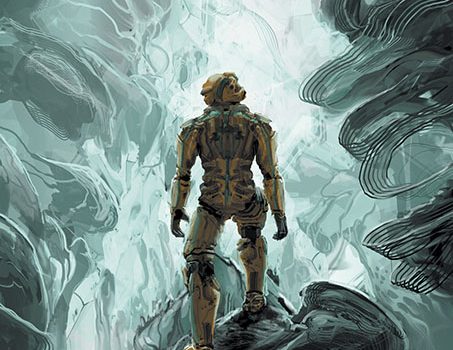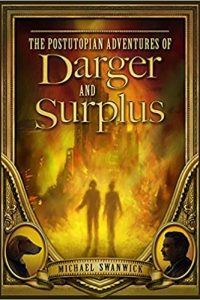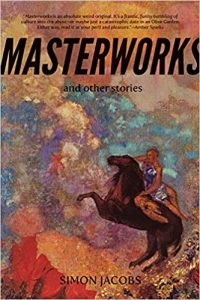Karen Burnham Reviews Short Fiction: Clarkesworld, BCS, Strange Horizons, Giganotosaurus, and Tor.com
 Clarkesworld 9/18
Clarkesworld 9/18
Beneath Ceaseless Skies 10/11/18, 10/25/18
Strange Horizons 9/18, 10/18
Giganotosaurus 9/18
Tor.com 9/19/18
Clarkesworld has a strong issue in September, leading off with Kelly Robson‘s story “A Study in Oils“. Written after Robson traveled to China on an arts grant, the story focuses on Zhang Lei, a Lunar hockey player running away from the consequences of a crime he committed on the ice. Lying low in a mountain town in China while waiting for an asylum application to go through, Zhang Lei gets to know the locals and the artists residing there. He returns to his passion for art and painting, working through his feelings about the event as we slowly learn exactly what happened. While there might have been a little more attention paid to the victim of the crime, the portrait of a troubled man using art to interrogate himself is very well done. Next up D.A. Xiaolin Spires provides commentary on today’s society of social media “influencers” in “Waves of Influence“. Skilled hacker Chenghui enacts a rather unlikely plan to apprentice herself to a major influencer in a bid to make her ailing sister happy. The world of the story is well thought out, and the result, what actually happens to Chengui’s relationship with her sister, is appropriately sobering. “Dandelion” by Elly Bangs is a multigenerational story with “I” (the narrator and youngest daughter) talking to “you” (her grandmother) and referring to “her” (the narrator’s mother) when discussing the alien artefact that the grandmother found. All of them are scientists whose careers entwine with this artefact, and the different interpretations it yields over time sync well with different eras of science fictional aspirations as well. Finally, “The Foodie Federation’s Dinosaur Farm” by Luo Longxiang (translated by Andy Dudak) is a really fun story. When extra-smart dinosaurs, draconis sapiens, overrun the titular farm (housed on a space habitat), A Lei is the sole worker left behind. He makes a deal with one of the dinosaur leaders to help them build primitive weapons for tribal warfare, all the while trying to figure out how to get rescued. The backstory of why this dinosaur farm came to be reminded me quite a bit of another piece of fun food-centric SF, Cordwainer Smith’s “From Gustible’s Planet” (1962).
In October Beneath Ceaseless Skies continues their 10th anniversary celebration with their second special double issue in a row, showcasing the breadth of stories that can all fall under the remit of “literary adventure fantasy.” A novelette, “The Tale of the Scout and the Pachydormu” by Gregory Norman Bossert starts out with descriptions of a seemingly cozy holiday tradition, then we get the story that inspires the tradition. There’s a governor who cannot sleep, the many attempts to fix the problem, and finally the titular Scout and beast who bring relief to the Governor, but with unforeseen consequences. It’s a story that is by turns absurd, charming, and creepy. “The Tragedy of Zayred the Splendid” by Grace Seybold is a story of two war bards, both deceased and cursed to try to influence their legacy by planting stories among the populace. As each tries to plant their narratives in society, they get increasingly creative and desperate, until finally even the truth is brought into service. I love how this story highlights the power of narrative in shaping perceptions and politics, especially in times of prolonged war, and the well-drawn relationship between two enemies who used to be on the same side. Jaymee Goh‘s story, “Magic Potion Behind-the-Mountains” features a young royal magistrate sent to administer a province far away from the capital. Upon hearing that the people in the region are uncommonly strong, he seeks to learn their secret. He respectfully asks a grandmother to teach him, and faithfully follows her training as well as keeping up with his duties. As such, he becomes much better integrated into the community and is able to stand with them against outside threats. This is a wonderful story about the magic that can be unlocked if people take time to really listen.
Rounding out October for BCS, Megan Arkenberg‘s story “The Oracle and the Sea” opens with a normal seaside scene described in the most loathsome terms possible, as perceived by a genius musician/would-be-revolutionary/oracle who has been banished there. I especially appreciated: “The sea is loudest at night. Kashmai… listens to it gnawing on the sand.” We learn how she wound up in this circumstance and what being an Oracle has meant for her life. In “The Bodice, The Hem, The Woman, Death” by Karen Osborne we get a powerful story of women in war-time. A high-class mother is planning for her tomboy daughter’s society debut as war encroaches closer and closer to their city. Determined to wait for her husband, a general, they stay too long and watch as their wealth is ransacked for the war effort. In this society gems can hold the souls of those departed, and the mother has always had the voices of her ancestors in her jewelry, whispering to her about upholding the standards of her social station. When those gems are appropriated to run machines of war and when her dresses are cut up for fabric, she becomes almost catatonic and her daughter has to step up. The love they have for each other, as unlikely as that seemed during the beginning of the story (set during a scene of adolescent/parent conflict), is extremely moving, as is the daughter’s strategy to save her mother. This is a story of survival, and women’s power and relationships in incredibly difficult circumstances, and it’s also a tale of how war and societal collapse can ultimately level a highly stratified society.
Two stories in September’s Strange Horizons feature particularly interesting scenarios. In “Seedlings” by Audrey R. Hollis, Pamela is able to take a pill that transforms her into a human cactus. Her partner is fine with that transformation, but, despite Pamela’s hints, Lydia doesn’t want to transform herself. While the metaphorical reading is obvious, the attention to detail regarding what life as a large, mobile cactus would be like was very engaging. In a more traditional SF setting, “Tamales in Space, and Other Phrases for the Beginning Speaker” by Gabriela Santiago features Carmela, a restaurant owner on a space station that serves humans and aliens. The alien lenguas’ communication involves a strong olfactory component, and parts of the story consist of triads of scent/taste descriptions, what Carmela is trying to communicate, and what kind of baby talk might come across to the lenguas. While trying to keep all customers satisfied, Carmela is also wheeling and dealing behind the scenes to gather the necessary ingredients to make tamales. In the end we find out how her most loyal alien customer translates that meal. Stories in which beings with massively different language systems learn to relate are some of my favorites in SF, and this one is very well done, piecing together a story using several different modes of storytelling.
This may not have been intentional, but all three original stories in Strange Horizon‘s October issue feature underworlds of various kinds. “The Palace of the Silver Dragon” by Y.M. Pang is a novelette that develops in fascinating ways. A young woman jumps into the waters to go down to the titular palace and live with the Silver Dragon. While this begins as something of a fairy tale when she becomes his lover, it turns into something much darker, both as she learns about the lives of those who made up the palace, but also as the dragon learns about her nature. While the story could possibly be shorter, it wound up in a place I never expected. Another dark oceanic novelette is “De Mother Jumpers” by Celeste Rita Baker. The story starts out describing an almost utopian underwater society made up of the descendants of those who jumped from slave ships and magically survived. They make their homes and lives mostly under the sea, although they are amphibious. Told in a distinctive dialect that takes a little getting used to, the narrator is a woman looking to make a new kind of life for herself and her lover and friends, when tragedy strikes. The way the community responds to the disaster is anything but peaceful or benign, and the trigger warnings for this story will be lengthy. Violence is also prominent in Isabel Yap‘s “Asphalt, River, Mother, Child“. Three young victims of violence wrought during Dutarte’s War on Drugs in the Philippines find themselves in Mebuyen’s part of the afterlife. She notices that they are not moving on as she would expect. She invades the dreams of a once-idealistic policeman who is horrified by what he’s become part of. This is a hopeful and healing story about the power of resistance in the face of almost overwhelming odds, and like all of the stories this month, quite intense to read.
Tor.com and Giganotosaurus happened to publish two pieces in September that use the same basic format to tell two completely different stories. “The Day Beth Leather Shot the Moon, As Told by Rosemary Bonebreak” by Sarah McGill and “Nine Last Days on Planet Earth” by Daryl Gregory both use the technique of vignettes, spaced out over years, firmly grounded in a specific time, to describe a life and a world. In McGill’s story, set in a Weird West 1880s and ’90s, Beth Leather is an itinerant librarian who travels all over with books to loan and tall tales to tell. Rose is the girl who has a mad crush on her. Rose lives out on the salt flats in a town that’s used to annual floods and annual visits from the adventurous librarian. Rose grows from a young girl to a woman, a surgeon in her own right, around the same time that Beth’s funding gets yanked. Can you shoot the Moon? And what do you get if you do? I’ve had an affection for Weird Westerns ever since Tim Pratt’s The Strange Adventures of Rangergirl (2005), and this one uses tall tales to great effect.
Daryl Gregory’s story starts in 1975 and every vignette jumps a greater span of time. At the beginning, LT is a young boy when a meteor swarm dumps millions of alien seed pods all over the Earth. As the world is changed by all the different alien plants that start taking over different ecological niches, the ultimate in invasive species, LT grows up. He deals with his mother and her succession of boyfriends and husbands, his religious father, realizing that he’s gay and falling in love, adopting a daughter and then a son with his partner, and getting a job with the USDA dealing specifically with the alien invasives. It’s a life, but a life and a world shaped by incredible circumstances. With Gregory’s writing I enjoy the character work and the worldbuilding in equal measure, always complementary of each other.
Recommended Stories:
“Dandelion”, Elly Bangs (Clarkesworld 9/18)
“Nine Last Days on Planet Earth”, Daryl Gregory (Tor.com 9/19/18)
“The Bodice, The Hem, The Woman, Death”, Karen Osborne (Beneath Ceaseless Skies 10/25/18)
“A Study in Oils”, Kelly Robson (Clarkesworld 9/18)
“Tamales in Space, and Other Phrases for the Beginning Speaker”, Gabriela Santiago (Strange Horizons 9/18)
“The Tragedy of Zayred the Splendid”, Grace Seybold (Beneath Ceaseless Skies 10/11/18)
“Asphalt, River, Mother, Child”, Isabel Yap (Strange Horizons 10/18)
Karen Burnham is an electromagnetics engineer by way of vocation, and a book reviewer/critic by way of avocation. She has worked on NASA projects including the Dream Chaser spacecraft and currently works in the automotive industry in Michigan. She has reviewed for venues such as Locus Magazine, NYRSF, Strange Horizons, SFSignal.com, and Cascadia Subduction Zone. She has produced podcasts for Locusmag.com and SFSignal.com, especially SF Crossing the Gulf with Karen Lord. Her book on Greg Egan came out from University of Illinois Press in 2014, and she has twice been nominated in the Best Non Fiction category of the British SF Awards.
This review and more like it in the November 2018 issue of Locus.
 While you are here, please take a moment to support Locus with a one-time or recurring donation. We rely on reader donations to keep the magazine and site going, and would like to keep the site paywall free, but WE NEED YOUR FINANCIAL SUPPORT to continue quality coverage of the science fiction and fantasy field.
While you are here, please take a moment to support Locus with a one-time or recurring donation. We rely on reader donations to keep the magazine and site going, and would like to keep the site paywall free, but WE NEED YOUR FINANCIAL SUPPORT to continue quality coverage of the science fiction and fantasy field.







